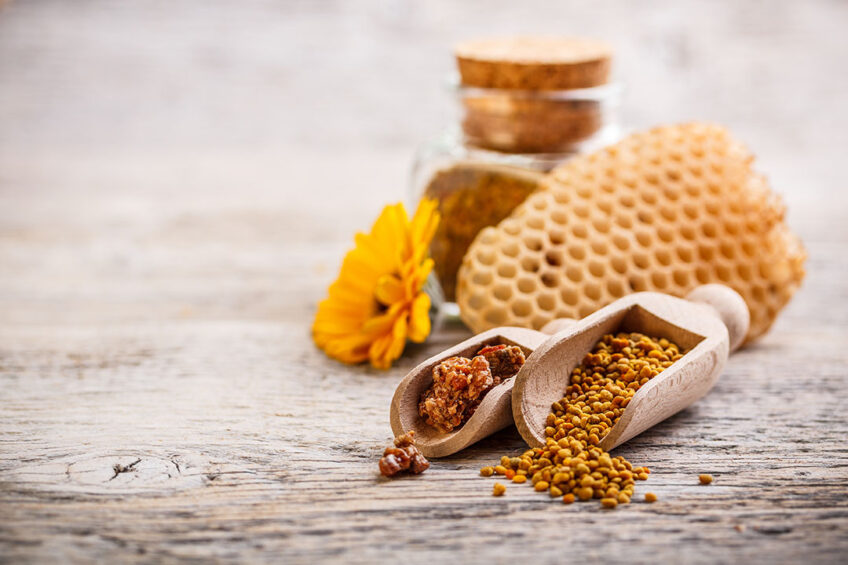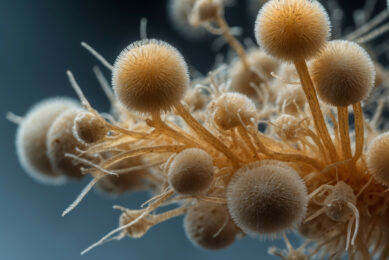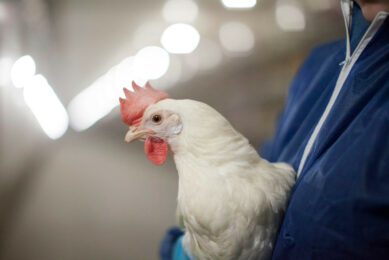Benefits of propolis and bee pollen in broiler diets

In a study published in the journal ‘Animals’ , researchers found performance and health benefits from supplementing propolis and bee pollen in broiler diets.
Current research is focusing on unveiling the use of natural products as nutritional strategies for optimising the health and performance of animals. These natural products are intended to fill the gap left by the ban on in-feed antibiotics as growth promoters.
What is propolis?
Propolis is a natural product derived from plant resins collected by honeybees from trees, especially willow buds, poplar and wild chestnut trees. To the bees, it is used as an insulating material in building beehives, as glue to fill the cracks and gaps in the beehive and it prevents the decay of any foreign organism that enters and dies in the hive. It also allows bees to reduce the incidence of diseases or parasitism due to its antimicrobial and antiseptic properties.
Chemical composition
Bee pollen consists of pollen grains mixed with nectar and the hypopharyngeal-glands secretion of the bees. The chemical composition of propolis and bee pollen, which is complex, usually consists of compounds such as polyphenols, phenol aldehydes, aromatic compounds, steroids, fatty acids, enzymes, as well as minerals and vitamins. Owing to this rich background, both products are worth exploring as promising alternatives to the use of in-feed antibiotics. The diverse properties of these products inspired the researchers working on the current study to evaluate the possible impact of propolis and bee pollen inclusion, alone or combined, into broiler diets on their performance, antioxidant status and immunological defence system.
Study setup
In the current study, propolis and bee pollen were added to broiler diets during 22 to 42 days of age at 1 g/kg either separately or in combination. The diets:
Control: a basal diet without supplementation,
Propolis group: basal diet + 1 g/kg propolis,
Pollen group: basal diet + 1 g/kg bee pollen,
Propolis + pollen group: basal diet + 1 g/kg propolis + 1 g/kg bee pollen.
Productive performance
From 22 to 42 days of age, propolis and bee pollen supplementation substantially increased the weight gain and feed intake in broilers, either individually or in combination (Table 1). Both products improved feed utilisation efficiency observed in the decrease in FCR values with the addition of the bee products. The significant improvement in the growth of broilers treated with a combination of propolis and bee pollen, compared to either the control or the individual addition of these products, was attributed to the possible higher nutritive value of the products as additional sources of protein, lipids, and carbohydrates.
Improving antioxidant status
In comparison to the control group, the total antioxidant capacity, and concentrations of antioxidant enzymes superoxide dismutase and catalase were higher when either propolis or bee pollen was added to the broiler diets, with the highest values obtained in the combination group. The researchers stated that both products contain components with antioxidant activity, such as phenolic acids and flavonoids, which have scavenging activities against free radicals. However, catalase activity was improved to a lesser extent. “This could be explained by the finding that the role of catalase enzyme as an antioxidant becomes more substantial during high levels of oxidative stress, which did not occur in this study,” they said.
Immune modulation
Results (Table 2) showed that both products modulate the immune system in a positive way. Supplementation of either propolis or bee pollen to the basal diet increased the total white blood cell count, reduced the heterophils to lymphocytes ratio and increased leukocyte cell viability; moreover, the magnitude of these improvements was higher when the products were supplemented in combination. The proliferation of both T-lymphocytes and B-lymphocytes was improved by the addition of either product, with the maximum stimulation observed in the propolis-pollen combined diet. It was explained that the immunomodulatory properties of propolis and bee pollen are associated with their high contents of flavonoids and phenolic acids.
It was concluded: “Our results are in line with the documented findings that the bioactive and antioxidant compounds in the honeybee products sustain the thymus and bursa tissues to consequently generate active T and B lymphocyte cells, respectively, and augment the immune modulation via influencing the lymphocyte proliferation in birds.”
On the same note, other reports suggest that antioxidant properties of flavones and phenols in bee products, may inhibit the synthesis of immunosuppressor, prostaglandin, and thus contribute to a higher humoral response. “It is also possible that these compounds prompt macrophages and lymphocytes to release interleukins, such as IL-1 and IL-2, which enhance the T- and B-cells’ mitogenesis,” they said.
Looking at the impact on the production of immunoglobulins, the inclusion of the products led to higher levels of IgM, IgA, and IgG, which are part of the first-line defence system in birds. However, both the IgM and IgG were activated to a lesser extent; it was suggested that these immunoglobulins are more active when challenged by infection.
Intestinal integrity
As part of the natural alternatives to antibiotics that promote intestinal health, propolis has been proposed due to its anti-inflammatory, antibacterial, and antioxidant properties that contribute to the maintenance of intestinal integrity.
In another recent study published in the journal Poultry Scienceresearchers from the National University of Colombia found that the supplementation of broiler diets with propolis improves productive performance, physiological parameters, and the expression of genes associated with intestinal integrity. The beneficial effects were evident at inclusion levels of 150 ppm in the starter and 900 ppm in the finisher diets. In their study, propolis upregulated the expression of genes associated with T-junction proteins in the jejunum and ileum.
Conclusion: Positive impact on broiler health
In conclusion, supplementation of propolis and bee pollen separately or in combination is recommended in broiler diets for their positive impact on the performance and health of broilers. For better comparison of the results from propolis studies as a feed additive it is recommended to analyse the composition of the different compounds in the propolis as different botanical sources could influence its nutritional value.
This article is a summary of the paper: Modulation of Antioxidant Defense, Immune Response, and Growth Performance by Inclusion of Propolis and Bee Pollen into Broiler Diets, published in Animals Volume 12, Issue 13.











